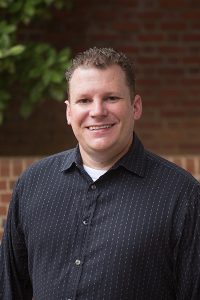DMin Candidates Grow in Self-Awareness to Lead From Their Strengths
Dr. Tate Cockrell was serving at a local church when he first became aware of the Leading From Your Strengths profile. He completed his individual assessment during a staff development retreat.
“When I saw my very own report, I was blown away by its accuracy,” says Tate. “I knew it would be a valuable tool for my counseling ministry.”
Tate became an LFYS certified practitioner a few years later. Since then, he regularly uses the profile as he counsels clients in marriage, recovery, grief, parenting, communication, and conflict resolution.
And he uses it with his seminary students. Under Tate’s guidance, the profile has become an integral part of the Doctor of Ministry program at Southeastern Baptist Theological Seminary (SEBTS).
A Core Curriculum Requirement
SEBTS Doctor of Ministry (DMin) candidates are active ministry professionals pursuing additional training in one of ten program specializations including missions, expository preaching, next-generation ministry, and women’s ministry. The program allows students to continue working full-time in ministry, combining that practical experience with mentoring and cohort support. Students travel to campus twice a year for residential seminars.
The candidates’ active ministry status is one reason the LFYS profiles are part of the program’s core curriculum. Students are able to process the data with Tate and other colleagues in their cohort.
“We require all of our DMin students to take the inventory prior to graduation,” says Tate. “I use the profiles as a tool for self-awareness, and without exception the candidates find LFYS to be extremely helpful.”
A Massive Movement to Adapt
A good example of the profile’s impact is DMin candidate David. He completed LFYS along with his colleagues in the DMin cohort. As Tate walked the students through their results, he noticed that David appeared to be shell-shocked.
Later, Tate met with David, who explained his reaction. David had been feeling unfulfilled in his current ministry role yet couldn’t understand why. He loved the community where he served, loved his congregation, and had no desire to move on.
The profile provided the answer – specifically in David’s Strengths Movement chart. The data revealed massive negative movement on two of the strength continuum scales. Negative movement indicates the user’s stress as he adapts to his environment by drawing on his less-dominant strengths.
David was still doing the same job he had always done, but as the church had grown there were considerable changes in his job responsibilities. Those changes required David to operate less in the sweet spot of his strengths and significantly more in using strengths that did not come naturally to him. David had been working hard to compensate to meet those requirements.
Tate and David talked through some ways he could staff differently. He was delighted to learn that there was another solution to his dissatisfaction other than leaving his current ministry assignment.
A Self-Awareness Tool
For Tate, LFYS is not only a cornerstone of the doctoral program at SEBTS, but also a key tool in his counseling ministry.
“One of the things that is so good about the profiles is their usability,” says Tate. “They are easy to understand.” Any user can benefit from the data without an advanced degree in psychometrics, psychology or testing, says Tate, particularly if that individual processes the information with a certified practitioner.
“So many of the problems that people bring into counseling are fueled or exacerbated because of their lack of self-awareness,” says Tate. Conflicts are often the result of differing personalities and strengths. But therein lies danger as people often attach moral value to their personalities or preferences. They begin to think that their way is “right” instead of understanding that their way is one “option.” The profiles help people to see the benefit of learning from and benefitting from others who are not like them.
“The profiles genuinely help people understand themselves better,” says Tate. “My only regret is that I didn’t start using them sooner in my counseling work and at the seminary.”
More Support for Pastors
Pastor-Turned-Administrator Helps Leaders Battle Isolation, Build Community

